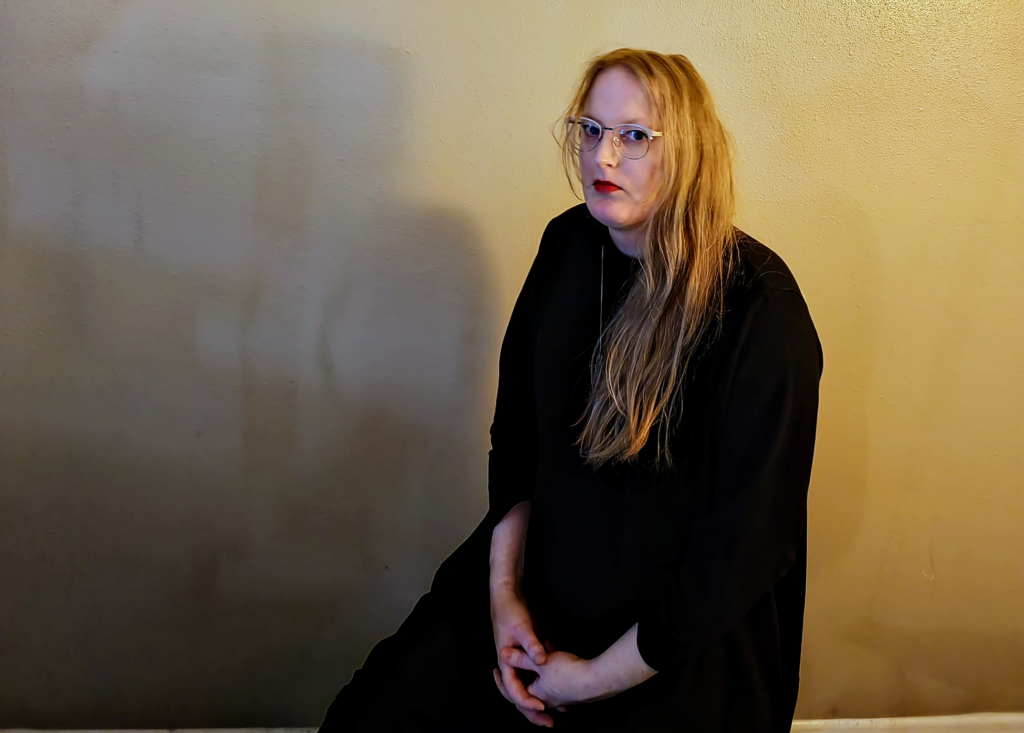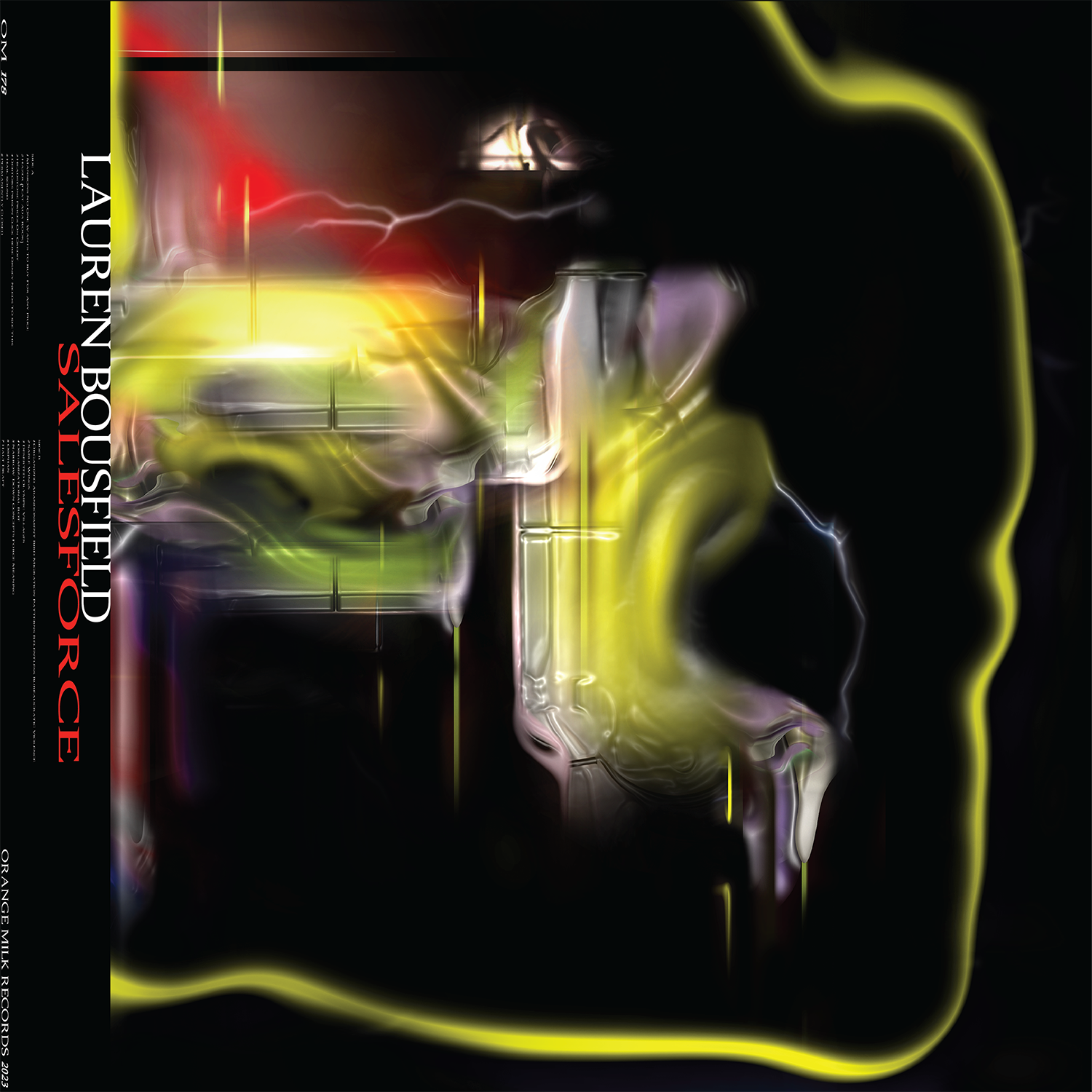Los Angeles-based composer and producer Lauren Bousfield has spent much of her career reflecting on the consequences of consumer ideology in American culture and identity. Even before she was releasing albums under her own name, her previous musical project—the playfully anarchistic Nero’s Day at Disneyland—featured EPs and albums titled after grieving abandoned shopping malls and the kinds of ritualistic platitudes that might have once inhabited their aisles.
On “Brand X,” from 2006’s Attention Shoppers, she cheekily snarls “You’re hideous and boring, so why don’t you just buy something?” A recurring observation Bousfield makes is noting how the act of purchasing is as much a social relation as it is an economic exchange – a manner of reifying our interpersonal sense of identity formation.
By 2009, Bousfield would release the fan-favorite From Rotting Fantasylands, an album whose opening track samples The Threepenny Opera from 20th century Marxist playwright Bertolt Brecht. Perhaps even more prominent and academically quoted than any of his plays is Brecht’s own concept of Verfremdungseffekt (“estrangement effect”), a technique wherein narrative structure and humor are used to form a lapse in the audience’s emotional identification with the play and characters. The purpose of such a technique is to inspire the audience to instead critically reckon with the socioeconomic consequences of the play’s scenario, situating themselves both in and outside of it.
In line with this method, Bousfield utilizes a similar mode of writing and composing on her latest record. Salesforce punctuates classically derived harmony and pop structures with biting textual irony and breakneck-tempo arrangements, all of which produce the effect of shaking the listener into contemplating the circumstances in which they are listening.
The clarity of this is apparent as early as the album’s opening track, “Mansions No One Wants to Buy at Any Price”—the title placing our focus not on the abandoned malls of her early work but rather on the kinds of equally vacant and exceedingly gaudy McMansions littered across American suburbs. Singing over a string arrangement with a heavy staccato feel, Bousfield laments that “the way we always, always turn our ideals into reality is repulsive,” her voice eventually giving way to flurries of elaborate programmed drum sequences.
By the second half of the song, her lyrical emphasis moves to how the aforementioned ideals are “so ingrained it doesn’t even need to be coherent” and that she “will spend these last years imagining what utopia looks like”—both in line with the kinds of Brechtian aesthetics which color much of her work. Bousfield’s music is not only about recognizing patterns of violence and power, but also about how we start treating them as normal once they become patterns—and about how it takes serious work to conceive of something different without succumbing to the limitations of idealism.
The harrowing realism of her observations is not from a position of hopeless detachment or fatalism though; rather, the urgency of her music is from a place of deep emotional investment in the state of the world. On the chorus of “Debtors Prison Click Here Disney Needs to See This,” Bousfield sings that “this world is enough, I swear it’s enough,” repeating the phrase like a kind of wistful mantra and thesis for her artistic project. She justifies the sentiment further into the song, adding that she’s “resorting to cliché because hyperbole seems cruel in light of all this everyday horror,” all while her voice and the instruments surrounding it glitch and stutter, forming a collective onslaught of syncopated drum breaks and frenzied analog synth melodies. Throughout the song, Bousfield is careful in both restraining and accentuating her own vocal delivery as she sings, stressing emotionally crucial moments and forming precise arcs.
This degree of songwriting craft is what sets apart Salesforce from Bousfield’s existing oeuvre. Not that her previous works were never song-driven, but if you were to map a trajectory of her career, one of the most noteworthy feats would be the manner in which she has made the form of her music increasingly legible while having its content become denser and more intricately layered. This is readily apparent in album highlight “Sable Wings,” a song that manages to load a staggering amount of musical ideas into its two and a half minute runtime, while also effectively moving through them formally as a piece with distinct movements.

To unpack it without getting too into the weeds: Bousfield opens the song in a waltz feel—itself a recurring staple of her compositional toolbox—before progressing to a verse section characterized by a half-time groove in its rhythmic pulse that’s embellished with elaborate drum programming. All the while piano, synths, and Bousfield’s own voice trade melodies, dynamically swelling in their delivery.
Then, in a blink-and-you’ll-miss-it moment, she reprises the waltz feel she opened the song with, deftly weaving the existing melodic development into this change before fully emphasizing it, crescendoing the returning melody into a full arrangement of ornate synths, horns, and processed vocal timbres. The full effect of this return is startling; the kind of movement that at once grapples the listener viscerally while encouraging them to notice new emergent details in the overall structure.
Of course, even as you begin to describe any song on Salesforce you will likely still find yourself omitting countless small, yet remarkable, details that animate Bousfield’s music and provide it with a kind of sui generis appeal. Despite clocking in at a brisk 33-minute runtime, the album is chock-full of dazzling brief moments and instrumental flourishes that only reveal themselves on repeat listens. The way the vocal melodies layer on top of and accent each other in “Headstone Prices on Credit,” the polyrhythmic flourishes in “Permanently Closed,” the introduction of a techno kick later into the same song, the way Bousfield sings “public execution at Disneyland” in “Organized Abandonment Bird Migration Patterns Relentless Bureaucratic Violence,” the subtle changes in timbre of the arpeggiated piano sequences throughout “Organizational Rot,” the careful use of a 5/4 time signature in the opening of “Orphan”—this entire review could be spent naming and describing these kinds of minutiae.
But part of their appeal is the overwhelming and critical joie de vivre they produce when experienced and discovered in gestalt. During the chorus of another standout track, “Hazer,” guest vocalist Ada Rook (of Toronto-based noise pop duo Black Dresses) sings: “Feeding the hurt into power, convince everyone you’re alive.” The song provides, if not a way out of the machine, then perhaps a way to cope with its omnipresence.
One of the most prevalent recurring themes of Bousfield’s work is the crushing weight of social commodification: how identities, beliefs, and relations are abstracted by power into consumable market goods (and how the reverse – brands legally and socially posing as Real People – happens in tandem). Salesforce is not merely an expression of hurt in this system, but an affirmation of genuine love within it and in spite of it. It is an album whose central argument is that being alive is not about being the right consumer and amalgamating the correct social goods; rather, there will always be bits and pieces of any person that can only be understood with closer scrutiny – idiosyncratic details both painful and inspiring that continue to protrude as meaningful and true even in a post-consumer consciousness world.
Salesforce is out now via Orange Milk Records. Support it on Bandcamp by purchasing a digital copy or get it on cassette or vinyl. Stream it over on Spotify or Apple Music. You can follow Lauren Bousfield on Twitter.

